I Forbidden Games
Palestinos jugando en #BeitHanoun: image via ferHomer @ferHomer, 22 April 2014
Sunset over #Gaza and #BeitHanoun tonight as ceasefires fall apart and conflict appears to escalate #happeningnow: image Seth Fratzman @afrantzman, 28 July 2014
"@KelvinNews: #BBC #Gaza the remains of a children's playground in #BeitHanoun." :'(: image via Zuwaina Salim @Zuebarbie, 26 July 2014
BREAKING: The Israeli army has attacked an UNRWA school in #BeitHanoun, Gaza: image via Humanitarian Relief @IHHen, 24 July 2014
II A rip in the fabric
Dozens feared dead as Israel shells UN shelter in #BeitHanoun #Palestine #GazaUnderAttack: image via al whit @soitiz, 24 July 2014
A UN team had to cut short a visit to the scene of Thursday's attack
on a school in Beit Hanoun when it encountered gunfire, UNRWA
spokesperson Chris Gunness says in a statement. The Israeli army had
been notified of the mission in advance, he says:
At
1400 today an UNRWA team which included an international weapons expert
went to the school at Beit Hanoun which came under attack yesterday
causing multiple deaths and injury. The aim of the visit to the site was
to survey the scene in the aftermath of the incident. The Israeli army
had been notified in advance about the composition of the team, the time
and purpose of the visit. The mission had to be cut short and the team
was forced to leave the area after gunfire around the school. UNRWA
regrets not being able complete even this initial assessment. We will
attempt to visit the site when the situation allows. We again underline
our call for an immediate and comprehensive investigation.
The Guardian, 25 July 2014
#BBC #Gaza The school that was hit in #BeitHanoun is now abandoned except for a few horses: image via Kelvin Brown @KelvinNews, 24 July 2014
#BBC #Gaza When we visited the school in #BeitHanoun we found blood stained furniture scattered in the playground: image via Kelvin Brown @KelvinNews, 24 July 2014
#IsraeliTerror Scenes from Kamal Adwan hospital after the zionist strikes on #UNRWA school in #BeitHanoun: image via CemDM @Defect101, 24 July 2014
III A pool of blood

a pool of blood in a @UN-operated school after an Israeli air strikes in #BeitHanoun, northern Gaza strip: image via Tamer Yazar @tameryazar, 24 July 2014
Escuela de #UNRWA #BeitHanoun que Israel bombareo #Gaza (Foto @AP), northern Gaza strip: image via Monserrat Galvan @MonsetGalvan, 24 July 2014
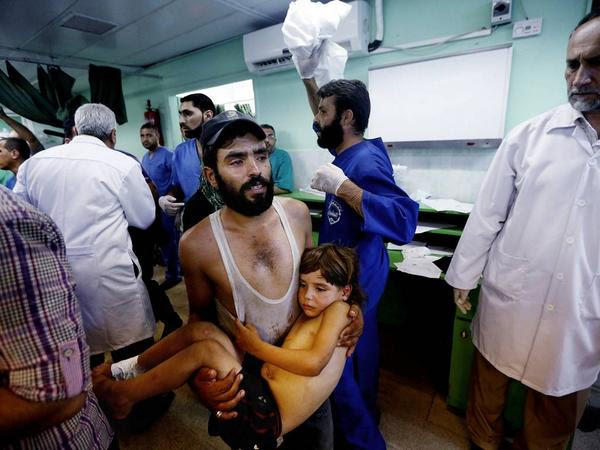
Palestinian carries a wounded child in #Israeli strike on #UN chool in #BeitHanoun #Gaza @Independent: image via Amr Heikal @Amr_Heikal, 25 July 2014

MT "@BoothWillliam: destroyed #BeitHanoun, huge bomb craters, minarets hit, fires still burning, bodies” self defence !: image via HudHud @FathimaTL, 26 July 2014
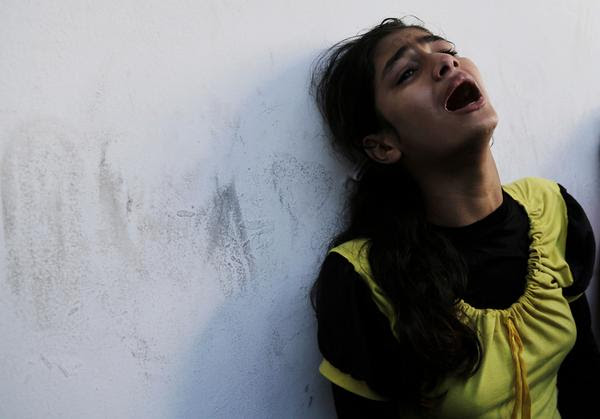
a displaced #Palestinian girl who lost a relative in a blast at a #UN school cries at #BeitHanoun hospital #Gaza: image via Tamer Yazer @tameryazar,, 26 July 2014
Belongings left behind at #UNRWA kids shelter in #BeitHanoun after bombing on Wed killing 16 #Gaza: image via Kristina Dei @kdei, 26 July 2014
#UNRWA kids school yard #BeitHanoun where 16 died, littered w/ razor sharp metal shrapnel.@UN @UNICEF: image via Kristina Dei @kdei, 26 July 2014
#BeitHanoun today. #Gaza death toll close to 1000. image by @hhenden: image via Rune Thomas Ege @rtege, 26 July 2014
IV In the war zone, Beit Hanoun, last summer
#Crime committed by #Israel terrorist army #BeitHanoun children and animals caught in this hellish war zone #Gaza: image via Hegazi is #Anti_Coup@Hegazy, 26 July 2014
#BBC #Gaza Panorama shot of the destruction to #BeitHanoun. The UN school that was hit is just next to this area: image via Kelvin Brown @KelvinNews, 26 July 2014
"@allisonCD: Family fleeing #BeitHanoun earlier today. #Gaza." image via _AlQuds_@AlQuds_, 26 July 2014
If you see this, does it make you wonder what happened to the people? #Gaza #BeitHanoun: image via Allison Deger @allisonCD, 26 July 2014
Classroom of #BeitHanoun school, still smouldering 48hrs after "single errant shell that hit an empty yard" #Gaza: image via James Wright @JamesW60729527, 27 July 2014
Back to #Nazi era! This how a hospital in #BeitHanoun looked like this morning after #IDF shelling!: image via Heba Haddad @Heba_Haddad, 26 July 2014
Así quedó el hospital #BeitHanoun en #Gaza tras recibir repetidos bombardeos de #Israel sin importarle los enfermos: image via Esio G. Moreno R. @EGMorenoR, 27 July 2014
@StanleyCohenLaw What happens to a school in #BeitHanoun when crazed Israelis think weapons are there: image via Srab Secularist @ArabSecularist, 27 July 2014
"@KelvinNews: #BBC #Gaza Abandoned wheel chair on the road outside #BeitHanoun hospital." #ICC4Israel #GazaUnderAttack: image via Sara @SaraQ1981, 26 July 2014
V "Only love makes life better"
Una joven palestina reacciona desde la puerta de su vivienda dañada, en #BeitHanoun #Gaza (Xinhua/ZP): image via XinhuaGráficaEspañol @Xinhua9, 19 August 2014
"Only love makes life better" at the #BeitHanoun Boys and Girls #school via @dancohen3000 /s/fnlA #GazaUnderAttack: image via Alif Bay Tay @AlifBayTay, 22 August 2014
VI Into the Ruins
here is #BeitHanoun, Gaza! a Palestinian girl holding her sister walks through debris near remains of a mosque!: image via Tamer Yazer @tameryazar, 27 July 2014
here is #BeitHanoun, northern Gaza!... #Palestinian Mukaram Kefema cries upon her return to what was the family house: image via Tamer Yazer @tameryazar, 27 July 2014
here is #BeitHanoun, northern Gaza strip... a #Palestinian woman carries her belongings past the rubble of houses: image via Tamer Yazer @tameryazar, 27 July 2014
Palestinians walk past destroyed houses in #BeitHanoun #Gaza: image via Amr Heikal @Heikal_Amr, 27 July 2014
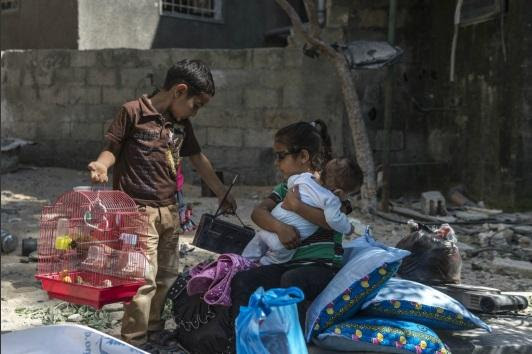
Children collecting belongings from their damaged house in #BeitHanoun while waiting for their parents: image via Osvaldo Calderón @Ostwaldo, 27 July 2014
"Everything's gone!" said Ahmed,11. #IslamicRelief was with him, at moment he saw his home collapsed #BeitHanoun #Gaza: image via Hatem Shurrab@HatemShu, 2 August 2014
"@Beltrew: A mural of Mickey Mouse peeks out from gutted building in #BeitHanoun -- an area entirely flattened #Gaza": image via Osama Bin Javaid @osamabinjavaid, 4 August 2014
#Palestinian woman at a hospital in #BeitHanoun. photo by Finbarr O'Reilly/Reuters: image via Pouria Moradi @mouradpouria, 3 August 2014
Cool le retrait de #Tsahal ! MERCI Les gazaouis peuvent enfin retourner dans leurs mai... Ah non :-((#BeitHanoun: image via Angry Bisounoours, 5 August 2014
A scene from #BeitHanoun #Gaza -- families assess the damage and collect any personal items: image via ICRC in Israel @ICRC_ilot 5 August 2014
Israel doesn't just bomb #Gaza. It wants it flat. Completely flat. Photo from BeitHanoun: image via Mariam Barghouti @MariamBarghouti, 10 August 2014
This is #BeitHanoun holocaust! #GazaUnder Attack #MyCam: image via Anas @EngAnasRajab, 8 August 2014
VII Broken Promises
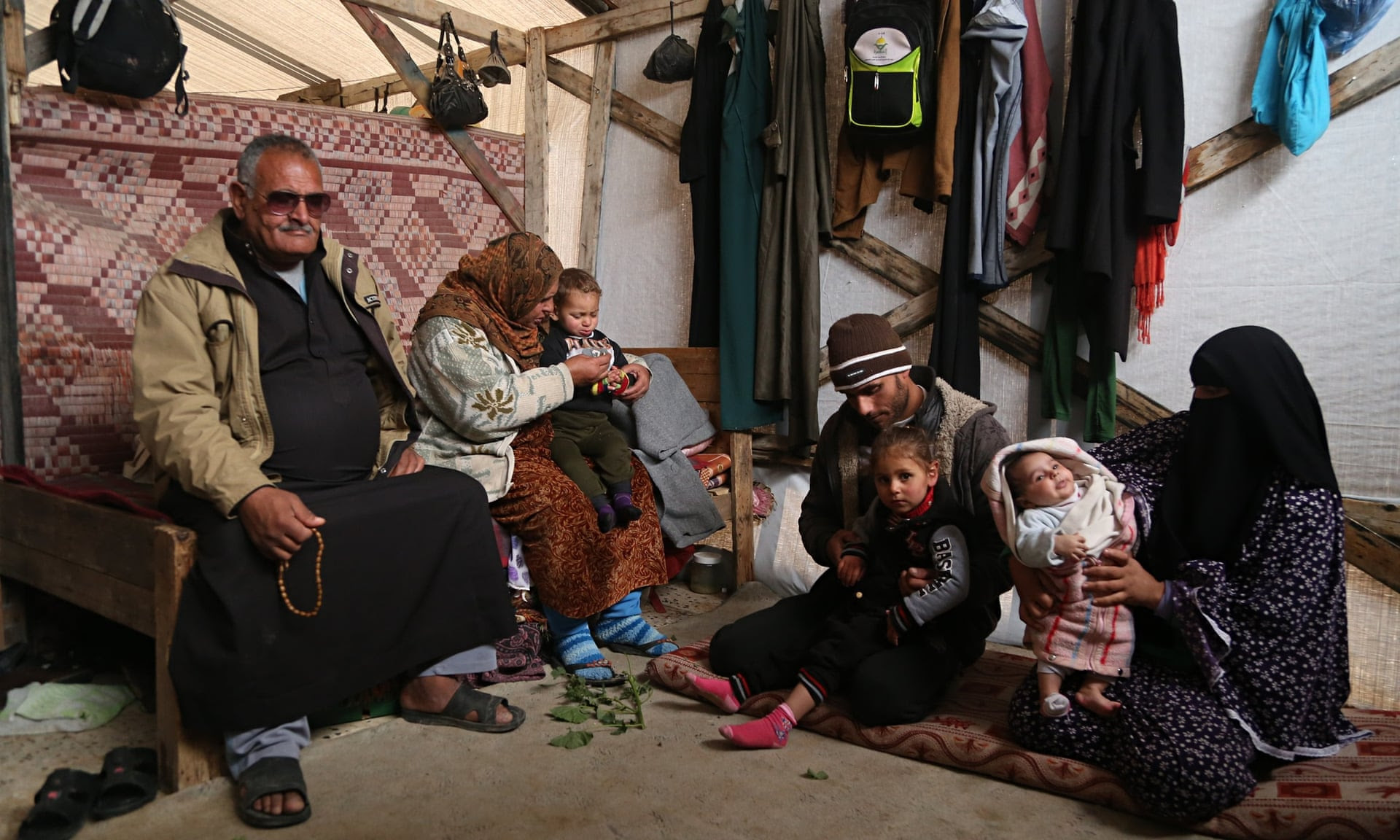
Jibril, left, lost two of his four grandchildren to hypothermia in the storms last month. The family now live in a tiny plastic-covered wooden structure in Beit Hanoun with a blanket for a door.: photo by Belal Hasna via The Guardian, 22 February 2015
The
world has broken its promises about rebuilding Gaza -- and the chldren
will suffer. Six months after international donors pledged billions
after the last
war, the cash has not materialised, lives remain shattered and the
desperate suffering goes on.
Chris Gunness, director of advocacy and strategic communications for The United Relief and Works Agency, The Guardian, 22 February 2015
Baby
Salma died of hypothermia at just 40 days old. Her body was drenched
with freezing rainwater. It was frozen “like ice-cream”. Gaza was hit by
a severe winter storm called “Huda” in January. Salma was its youngest
victim.
I meet Salma’s mother, Mirvat, and 14 members of her extended family
in the very place, indeed the room, where Salma slept during her last
night at home. They still live there in Beit Hanoun, northern Gaza, in a
tiny three-room wooden structure, covered with plastic. When I see it
from the road, I assume it houses animals. The door is a blanket which
flaps in the biting wind. It is raining. Water flows in. Mirvat pulls
back the sodden carpet that serves as flooring and scoops the wet sand
below. Memories of Salma’s death on 9 January are painfully fresh.
“The night she died the storm was strong. We were all soaking wet,
but some of us managed to sleep. The rain came and in and drenched
Salma’s blankets. I found her shaking. Her tiny body was frozen like
ice-cream. We took her to hospital, but later the doctor called. Salma
was dead. My beautiful girl weighed 3.1kg at birth. She was healthy and
would be alive today if we had not been bombed out of our home in the
war and reduced to living like this.”
During the Gaza conflict last summer, Mirvat, her husband and four
children lived in a complex of five simple buildings with their
40-member extended family, just one kilometre from the barrier between
Gaza and Israel. Her father-in-law, Jibril, knew that life on the
frontline was unsustainable.
“There was a smell of death in the air. The children were traumatised
and couldn’t sleep,” he tells me. “After a week of fighting we fled as
the bombs fell around us, terrified for our lives. We went to my
brother’s house, but that became too dangerous, so we took refuge in a
hospital. After an hour, that was hit, so we ran to the shelter of an
UNRWA [United Nations Relief and Works Agency] school. There were
thousands of us living in a school built for one thousand students. So
after the war we came here.”
The
family tragedy does not end with Salma. Her sister Maes, aged three, is
in hospital suffering from respiratory problems brought on by exposure
to harsh weather. “I worry that Maes will die like Salma,” says Mirvat.
Outside, I meet Mirvat’s sister-in-law, Nisreen, 28. Her son died at
just 50 days old in the UNRWA school where the family had taken refuge.
“Moemen’s death was unexpected. There was nothing anyone could do to
save him. I felt that he was cold. I covered him up and I put him to
sleep. The child was sleeping in my lap. When I woke up at four in the
morning he was blue. Moemen was dead. I have waited for a boy for five
years, and now he’s gone.”
Jibril is an extraordinary grandfather, even by Gazan standards. Two
of the four children killed by hypothermia in Gaza in recent weeks were
his grandchildren. He says the war has robbed him of his past and his
future. “My home lies in ruins, flattened. I worked hard for over 40
years as a farmer. I provided for my family. But in a matter of hours it
was all lost. I had a piece of farmland that they destroyed. We planted
lemon trees on it 17 years ago, but tanks bulldozed it.”
Jibril is an entrepreneurial man deliberately reduced to destitution.
“My son has a donkey and earns five to 10 shekels a day [£1 to £2]
transporting rocks to support all of us. We live mainly on hubeyza [a
wild grass eaten like spinach] which we can pick in the streets.”
And whom does he blame for the untimely death of his grandchildren?
“The international donor community killed those babies,” he tells me.
“They have pledged billions. But where is it? We need a home, not
promises. UNRWA has no money. What can they do without financial
support?”
Jibril is correct. UNRWA, the agency for which I work, was forced to
suspend what for this family would have been a life-saving programme
just three weeks ago. After the conference in Cairo last October at
which donors pledged $5.4bn to rebuild Gaza, we created a $720m project.
With the generous pledges at Cairo we were certain the funds would be
there. Or so we thought. With this money, we aimed to give rental
subsidies to people whose homes were uninhabitable. We hoped to give
cash so people could repair and rebuild their houses. But the billions
pledged did not materialise and the programme was left with a shortfall
of nearly $600m.

Baby Salma’s uncle with the wild grass soup that makes up the majority of the family’s diet: photo by Belal Hasna via The Guardian, 22 February 2015
The day after we announced suspension of the cash assistance, anger
boiled over. The office in Gaza of the UN special co-ordinator for the
Middle East peace process was attacked. The threat of violence remains.
You can feel it in the air, just like last summer.
Certainly the need is great and the sense of desperation is palpable
and profound. We estimate that approximately 100,000 housing units were
damaged or completely destroyed, affecting hundreds of thousands of
people. Many of those with homes that are habitable have found
themselves on water and electricity grids that are dysfunctional.
Rebuilding Gaza physically is only part of the story. If Salma and
Moemen had lived, what future would they have had? The next generation
in Gaza is traumatised, shocked, brutalised. The recreational spaces
where they play are littered with some 8,000 pieces of unexploded
ordnance.
The UN estimates that some 540 children were killed in the conflict,
many in their own homes. UNRWA could not provide safe sanctuary. Our
schools took direct hits on seven occasions. Children died in and around
classrooms and playgrounds under the blue UN flag. Almost every child
in Gaza has a family member or friend who was killed, injured or maimed
for life, often before their eyes. One thousand of the 3,000 children
injured in the conflict are likely to have physical disabilities for the
rest of their lives. Had Salma and Moemen lived to adulthood, they
would have entered a job market with an unemployment rate which hit an
unprecedented 47% in the third quarter of last year.
Average power
blackouts are 18 hours a day. Around 90% of all water in Gaza is
undrinkable.
Gaza is not a natural disaster. It is man-made, the result of
deliberate political choices.
Different choices must now be made. What
is the point of rebuilding a place while condemning its population to
the indignities of aid dependency?
The situation teeters on the brink of another major crisis, with
worrying implications for Palestinians and Israelis. Funding for
humanitarian operations is urgently needed, but such assistance will
only mitigate the worst impacts of the crisis.

The shack in Beit Hanoun where Baby Salma lived with 14 members of the extended family: photo by Belal Hasna via The Guardian, 22 February 2015
People in Gaza need urgent change: they need all parties to the
conflict to abide by their obligations under international law; the
removal by Israel of all obstacles to the enjoyment of human rights; and
the immediate lifting of the blockade, allowing imports and exports, a
necessary step to enabling economic recovery.
The rockets fired from Gaza must cease. There is an urgent need for
Palestinian unity, so that the Palestinian Government of National
Consensus can assume its governance and security functions in Gaza. The
Middle East Quartet should exert effective political pressures, as the
time for humanitarian action alone is long past.
I urge donors to translate their pledges at the Cairo conference into
actual disbursements, and for the international community to promote
and demand compliance with international law. Most importantly, parties
to the conflict have obligations to protect civilians. Those found
guilty of violations should be held accountable and brought to justice.
Another major crisis can be averted. If we mobilise the political,
financial and moral resources to break out of the deadlock, we can give
Gaza back its future. It is too late for baby Salma and Moemen, but it
is not too late for the next generation, some 950,000 children they left
behind.
#Israel'i soldiers scrawled this message for schoolchildren in #BeitHanoun #GazaUnderAttack #JewishNazis: image via Rafael @achops, 26 August 2014
A #Palestinian child views a classroom, damaged by a massive fire at #United Nations boy's middle school in #Beit Hanoun: photo by Ashraf Amra, image via /Anadolu Images @anadoluumages, 18 February 2015
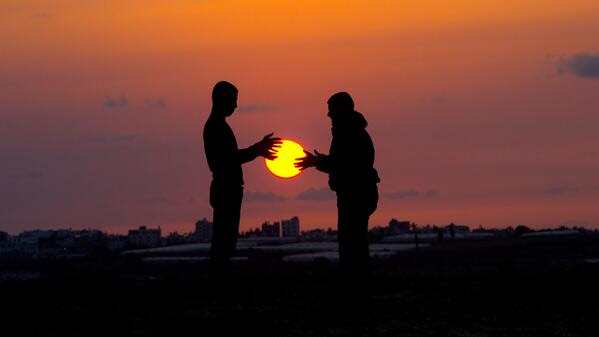




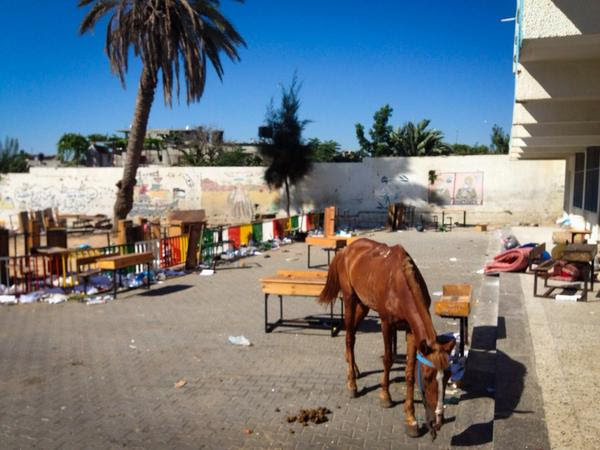
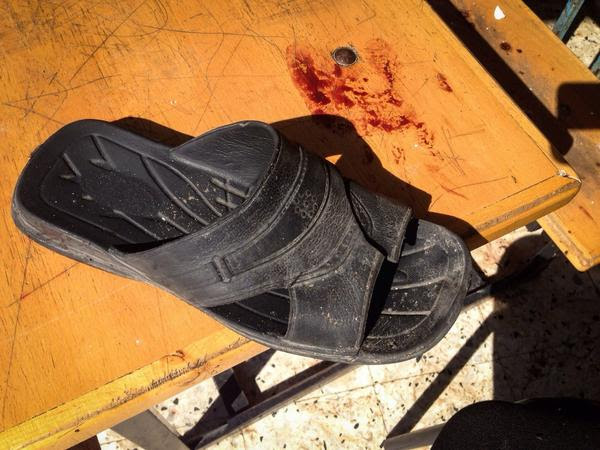















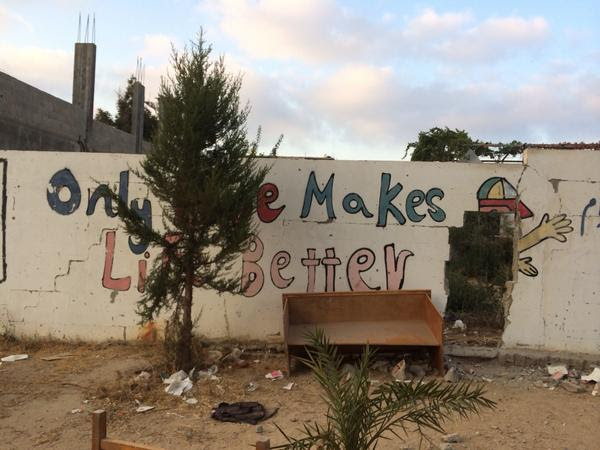


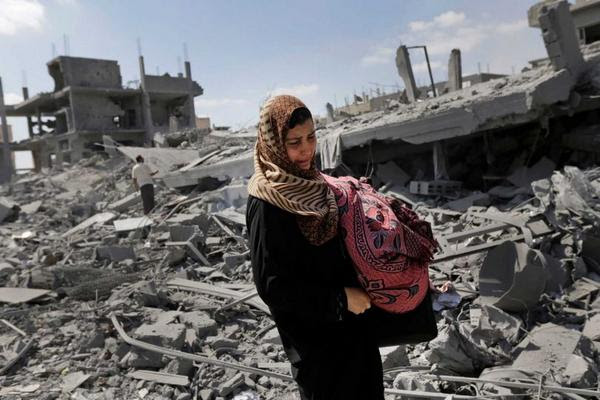
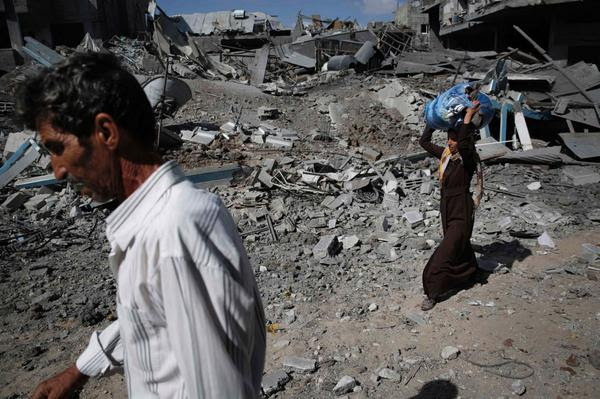


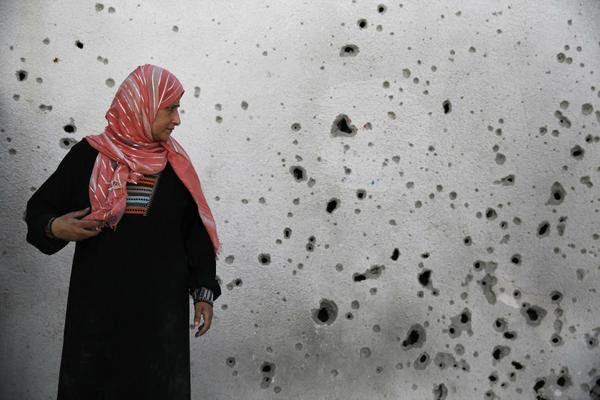




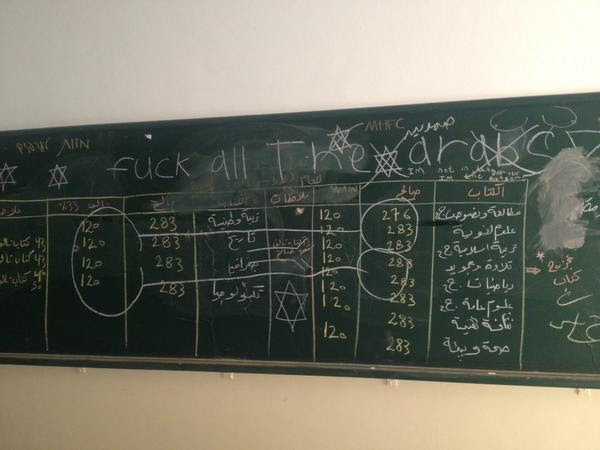




5 comments:
How the Israeli army destroyed Beit Hanoun in one hour
Hunger (Faim)
I only find within my bones
A taste for eating earth and stones.
When I feed, I feed on air,
Rocks and coals and iron ore.
My hunger, turn. Hunger, feed,
A field of bran.
Gather as you can the bright
Poison weed.
Eat the rocks a beggar breaks,
The stones of ancient churches' walls;
Pebbles, children of the flood,
Loaves left lying in the mud.
___________________________
A. Rimbaud (Alchemy of the Word, Un Saison en Enfer, trans.?)
Tom, there's almost something fatalistic about the destruction of the Palestinians, don't you think? As it was with the Native peoples. In both cases the settlers saw the land as a wilderness, people as "dots and dreams".
Thanks very much, Abdal-Hayy and billoo, for stepping up to speak about the unspeakable ones, the ones forgotten by history.
If surviving forever on a diet of rocks and stones and poison weeds were all the future held in store, how could a people go on?
And if the offers of a few scraps from the pantry of the "international donors" were all that was keeping them going, and the international donors were affected by the familiar shadow of second thought between word and deed, then what?
Chris Gunness has held up admirably under terrific stress from all sides in a virtually impossible job, and all power to him for that.
And when he asks the beleaguered paterfamilias in Beit Hanoun, two of whose grandchildren have just died of exposure, where to lay the blame for all this loss, all this sorrow, it's easy to understand why both Jobril and Chris point the finger at those fairweather donors.
But the death of those children and the ruination of that old man's house, family, and ultimately also his memory, was not accomplished by the international donors.
The war criminal who was actually responsible for all that destruction, all that death, all that suffering, is not an international donor.
It's a guy who's planning to barge into the US Congress next week, to hard-sell a little more of the same old snake oil.
Yes, billoo, I think there is some comparison to be made along the lines you've suggested. The nobility of resistance in defeat makes a better historical image than the pathos of acquiescence in defeat.
But either way, being overcome by a brutal dominating power is always going to be a bitter thing, and the bitterness is not going away soon.
"Yes, I'll hold your coat, go and
fight," someones told Hamas and
they believed. Hamas fought courageously against a militarily
far superior enemy.
Now that the milk has been spilt,
where are the someones who from
afar urged the fight? Now that long term suffering has arrived where are the support teams for
the Palestinians.
Where for example are the rich
Arab states of the Gulf? Best to
recall that in history, the persons best at making war are usually not the best at delivering the peace.
Post a Comment